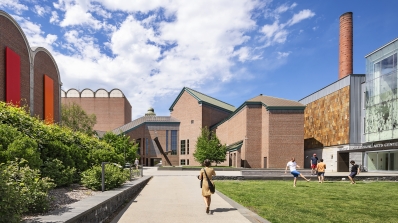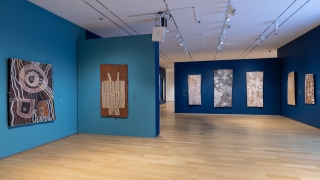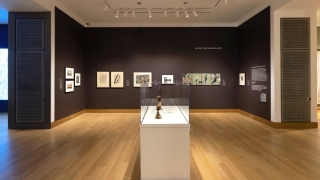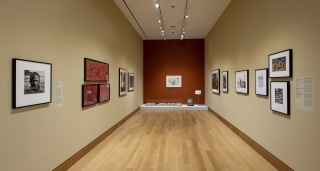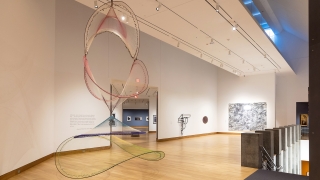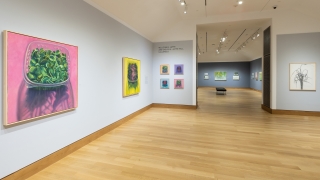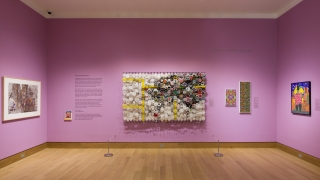Exhibitions Archive
Maḏayin is the result of a seven-year collaboration between the Kluge-Ruhe Aboriginal Art Collection and Indigenous knowledge holders from the Buku-Larrŋgay Mulka Centre in northern Australia. It chronicles the rise of a globally significant art movement as told from the perspective of the Yolŋu. Maḏayin presents more than 90 iconic paintings on eucalyptus bark, inviting audiences across the US to discover this inspiring story of the sacred, the beautiful, and the power of art.
Faces and Forms of Pilgrimage
Journeys BeyondExamining pilgrimage through a cross-cultural lens, Journeys Beyond: Faces and Forms of Pilgrimage is curated by Emily Charland '19. The exhibition explores pilgrimage from both religious and secular traditions, with specific interest in the multitude of influences on and impacts of acts of transformative movement.
A Space for Dialogue is a student-curated exhibition program that began in 2001. Hood Museum of Art interns create an installation drawn from the museum’s permanent collection by engaging with every aspect of curation, from doing research and selecting objects, to choosing frames and a wall color, to planning a layout and writing labels and a brochure, to giving a public talk. There have been over 100 A Space for Dialogue exhibitions on a wide variety of themes.
Culture and Conflict in Central America
Bolas de FuegoBolas de Fuego: Culture and Conflict in Central America draws from the Hood Museum’s limited collections to tell stories of communities from the following countries: Belize, El Salvador, Guatemala, Nicaragua, and Panama. Focused on the conflict-laden twentieth and twenty-first centuries, the installation examines turning points in the region’s political and social history, while attending to the themes of race, ethnicity, and migration.
This exhibition was curated in conjunction with LACS 8: Politics and Culture in Transnational Central America and LACS 50.17: Land, Belonging and Social Change in Latin America.
Bolas de Fuego: Cultura y conflicto en América Central se basa en las reducidas colecciones del Museo Hood para contar historias de comunidades provenientes de los siguientes países: Belice, El Salvador, Guatemala, Nicaragua y Panamá. Centrada en los siglos XX y XXI los cuales fueron cargados por conflictos bélicos, la instalación examina los puntos de inflexión de la historia política y social en la región con enfoque en los temas de raza, etnia y migración.
Esta exposición fue organizada en conjunto con LACS 8: Política y Cultura en América Central Transnacional y LACS 50.17: Tierra, pertenencia y cambio social en América Latina.
What do you think about when you hear the phrase draw lines? A line can separate but also connect; it can create divisions and boundaries but also generate space. For artists, the line has been a critical apparatus for exploration. Through weaving, painting, sketching, cutting, collaging, or layering—whether their lines stretch in two dimensions or extend into our space—the artists in Drawing Lines activate the line as a generative form with expansive potential.
Recent Work by Louise Hamlin
In the MomentThis exhibition celebrates the work of Louise Hamlin, the former George Frederick Jewett professor of studio art and area head of printmaking at Dartmouth. Inspiration can be found in many places. For Louise, inspiration is not found in the grandiose, but rather in the subtle, familiar, and overlooked corners of our everyday world. In each scene, whether a fog-filled landscape or bundle of garlic scapes from the farmstand, Hamlin has explored light and form, creating images that suggest paint (or ink) and color as her driving force.
Color holds many negative associations as something that has been constructed in opposition to whiteness. Whereas whiteness tends to symbolize purity, beauty, and refinement, color often represents the dirty, exotic, and primitive. Coloring the Western Canon examines how our relationship to color has largely been shaped by Eurocentric concepts of art. By navigating the various ways nonwhite artists use color to explore their cultural identities, this exhibition challenges the boundaries of our whitewashed Western canon and asks you to reconsider how you think about color.
A Space for Dialogue is a student-curated exhibition program that began in 2001. Hood Museum of Art interns create an installation drawn from the museum’s permanent collection by engaging with every aspect of curation, from doing research and selecting objects, to choosing frames and a wall color, to planning a layout and writing labels and a brochure, to giving a public talk. There have been over 100 A Space for Dialogue exhibitions on a wide variety of themes.
